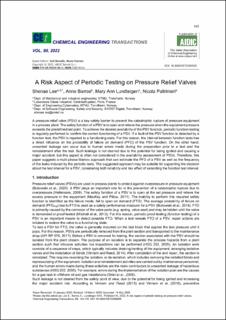A Risk Aspect of Periodic Testing on Pressure Relief Valves
Peer reviewed, Journal article
Published version

Åpne
Permanent lenke
https://hdl.handle.net/11250/3027585Utgivelsesdato
2022Metadata
Vis full innførselSamlinger
- Publikasjoner fra CRIStin - SINTEF AS [5802]
- SINTEF Digital [2501]
Sammendrag
A pressure relief valve (PSV) is a key safety barrier to prevent the catastrophic rupture of pressure equipment in a process plant. The safety function of a PSV is to open and relieve the pressure when the equipment pressure exceeds the predefined set point. To achieve the desired availability of the PSV function, periodic function testing is regularly performed to confirm the correct functioning of a PSV. If a fault of the PSV function is detected by a function test, the PSV is repaired to a functioning state. For this reason, the interval between function tests has a direct influence on the probability of failure on demand (PFD) of the PSV function. On the other hand, unwanted leakage can occur due to human errors made during the preparation prior to a test and the reinstatement after the test. Such leakage is not desired due to the potential for being ignited and causing a major accident, but this aspect is often not considered in the availability assessment of PSVs. Therefore, this paper suggests a multi-phase Markov approach that can estimate the PFD of a PSV as well as the frequency of the leaks induced by the periodic tests. The suggested approach may be suitable for supporting the decision about the test interval for a PSV, considering both reliability and risk effect of extending the function test interval.